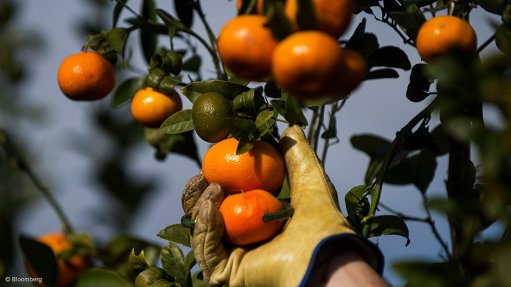Renewables programme showcases benefits of public–private collaboration
The success of the Department of Energy’s (DoE’s) Renewable Energy Independent Power Producer Procurement Programme (REIPPPP) is a shining example of South Africa’s ability to undertake large infrastructure programmes to boost the local economy, despite the current period of slow growth internationally, says renewable-energy project developer Solar Capital chairperson Paschal Phelan.
The public–private partnership through the REIPPPP has allowed for energy growth and successful private investment, compared with a number of other international renewable-energy programmes that have encountered difficulties and setbacks.
According to Phelan, the renewable-energy developers involved in the REIPPPP have funded their facilities largely through independently sourced international investors and local banks, significantly improving the viability of these projects. “About R47-billion of the programme’s awarded bidder status reached financial close in the first round and R28-billion in the second round.”
A recent renewable-energy report by Investec Bank pointed out that, in terms of contributing to South Africa’s gross fixed capital formation, the first two rounds of successful REIPPPP bidders accounted for 12.7% and 7.1% of private-sector fixed investment respectively.
Phelan asserts that this investment allows for further energy creation and, thus, an enabling environment that will positively contribute to improving growth of the currently constrained gross domestic product (GDP) in South Africa of about 3.5%.
In comparison, the building of coal-fired power stations, such as State-owned power utitlity Eskom’s Medupi and Kusile power plants, required government funding and guarantees.
In early 2015, energy analyst Chris Yelland stated that the interest bill for Medupi and Kusile amounted to R29.2-billion and R48.7-billion respectively. These projects’ running years behind schedule also contributes to the country’s confined GDP growth, Phelan adds.
The amount invested in the development of the Solar Capital De Aar project totalled R2.2-billion for the first phase, which came on line in 2014, and R2.6-billion for the second phase, which came on line in March this year. Although this involved considerable start-up costs, Solar Capital is budgeting for a five-year payback term.
Phelan says it is important to note that the DoE is taking firm steps to improve financial energy-investment models in South Africa. He highlights that, during the Budget speech in February, Finance Minster Pravin Gordhan announced that the independent power producer programme would be extended beyond renewables to include coal and gas power projects. “This is a logical way forward in terms of investment, but is most likely not the fastest way to provide more energy to South Africa,” Phelan argues.
Solar Capital mounted 9 000 solar panels a day during the construction of the 175 MW De Aar solar farm. Both phases of the project were constructed in 28 months.
Phelan says coal-powered stations have traditionally been built to deliver more electricity than solar power. “Eskom reports that Medupi and Kusile will have a capacity of 4 800 MW each. However, the DoE is invested in providing a well-[considered] electricity mix for the country and, as such, announced its intention in October last year to create the 1 500 MW [the De Aar] solar facility . . .”
According to growth consultancy Frost & Sullivan, the operational costs of Medupi and Kusile, when taking into account external factors, such as the cost of water use and carbon dioxide emissions, are about R2.35/kWh and R1.94/kWh. In comparison, solar power in South Africa can now be produced for less than R0.70/kWh.
Phelan explains that the electricity produced by solar power worldwide has doubled seven times since 2000. “Part of the reason for this is that solar is not a fuel, but a technology. Owing to economies of scale and increasing efficiency, prices of solar technology and supply continue to fall, as does the price of batteries for energy storage.”
He adds that this has resulted in fossil fuel demand declining in developed nations, while developing countries, such as South Africa, are still adding coal to the energy mix, owing to rapid demand for further energy supply.
“Investing in solar power makes sense. It has minimal operational costs, is environmentally friendly and the source of energy is abundantly free, green and sustainable. It is the way the world is moving and South Africa is fast becoming a leading force in renewable- energy programmes,” concludes Phelan.
Comments
Press Office
Announcements
What's On
Subscribe to improve your user experience...
Option 1 (equivalent of R125 a month):
Receive a weekly copy of Creamer Media's Engineering News & Mining Weekly magazine
(print copy for those in South Africa and e-magazine for those outside of South Africa)
Receive daily email newsletters
Access to full search results
Access archive of magazine back copies
Access to Projects in Progress
Access to ONE Research Report of your choice in PDF format
Option 2 (equivalent of R375 a month):
All benefits from Option 1
PLUS
Access to Creamer Media's Research Channel Africa for ALL Research Reports, in PDF format, on various industrial and mining sectors
including Electricity; Water; Energy Transition; Hydrogen; Roads, Rail and Ports; Coal; Gold; Platinum; Battery Metals; etc.
Already a subscriber?
Forgotten your password?
Receive weekly copy of Creamer Media's Engineering News & Mining Weekly magazine (print copy for those in South Africa and e-magazine for those outside of South Africa)
➕
Recieve daily email newsletters
➕
Access to full search results
➕
Access archive of magazine back copies
➕
Access to Projects in Progress
➕
Access to ONE Research Report of your choice in PDF format
RESEARCH CHANNEL AFRICA
R4500 (equivalent of R375 a month)
SUBSCRIBEAll benefits from Option 1
➕
Access to Creamer Media's Research Channel Africa for ALL Research Reports on various industrial and mining sectors, in PDF format, including on:
Electricity
➕
Water
➕
Energy Transition
➕
Hydrogen
➕
Roads, Rail and Ports
➕
Coal
➕
Gold
➕
Platinum
➕
Battery Metals
➕
etc.
Receive all benefits from Option 1 or Option 2 delivered to numerous people at your company
➕
Multiple User names and Passwords for simultaneous log-ins
➕
Intranet integration access to all in your organisation


















